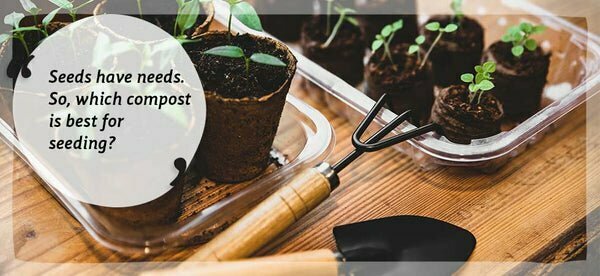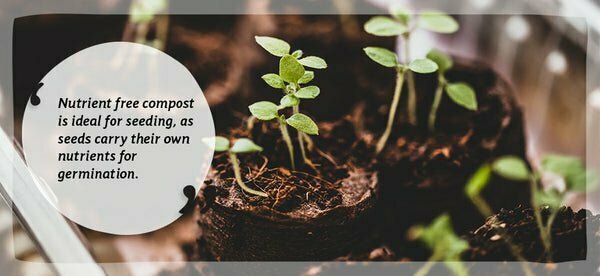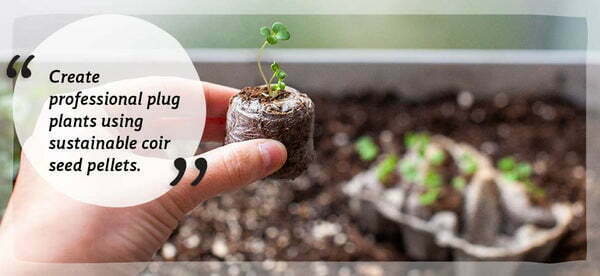What is the best compost for starting seeds?
Growing from seed is a fantastic way to fill your garden, your plate and your vases. A vital step is to select the best compost for starting seeds off. But what exactly is that?
Mimicking nature
In the wild, most seeds lay dormant in winter. During that time, the soil contracts and expands as it freezes and thaws because of ice and snow. This breaks up the soil enough for seeds to have the space to establish roots and germinate.
A good seed compost offers free drainage, ensuring young roots won’t rot in standing water. A light and airy seed compost allows seedlings to root deeper and wider, and become more well-established. The result is a stronger mature plant.
Room to stretch their legs
If you’ve tried planting certain seeds into soil, you may have been disappointed. Many garden soils are too dense for young roots to push through. It can also contain pests and diseases that pounce on seeds before they have a chance to grow. Soil can also slightly acidic or alkaline, which might not be the best match for your seeds. A seed compost made from coconut fibre such as Coco Grow+ is naturally pH neutral. This means it’s suitable for a wider number of plants than normal soil.

Can you use multi-purpose compost for seeds?
General multi-purpose compost has extra nutrients. And surely the more you feed seeds, the stronger they’ll grow, right? Wrong! A bog-standard multipurpose compost won’t necessarily do seeds any favours. More is not always better.
Seeds already carry all the nutrients they need to kick-start their life as a plant. Overwhelming them with nutrients means their roots won’t work as hard, leading to a weak foundation. Plus if they spurt up too high too soon, their stems won’t be strong enough to support them. This is when plants are called ‘leggy’.
Most multi-purpose comport uses a liquid feed, which delivers a lot of nutrition when first used and then quickly used up. A controlled release fertiliser like that used in our all-purpose compost Coco Boost ensures nutrients are released over a 6 month period without the initial overload. This makes an NPK fertilised peat-free compost like Coco Boost useful as a seeding compost for a range of plants, fruit and vegetables. However you may want to add your own specific nutrient mix rather than having this pre-added.
What’s the best compost for sowing vegetable seeds?
Good question. It depends what types of vegetables you want to grow and the size of its original seed.

For tiny seeds It’s best to sow small seeds like lettuce in a peat-free organic mix like Coco Grow. It’s biodegradable, with good drainage and an airy structure for roots to weave through. Plus, unlike home-made compost, it’s free of weed seeds which could affect early plant growth.
Put your wetted, expanded and fluffed up Coco Grow into a seed tray, then lightly press down to take out any major air pockets. Plant the plant the seeds following your packet instructions, then water.
Individual, larger seeds
For larger seeds like courgettes, our space-saving coir compost Coco Dots give them the space they need. These coir plug pellets are just 4cm wide but expand when you add water.
Place the seed in the centre of the watered pellet. Then just keep it damp until it germinates and develops its own root system. You then have your very own professional gardener plug plant for planting out or potting on!

Once the plant is ready for a bigger pot, or to be planted out, just pick up your plug plant and pot it into its new home. The protective mesh holds the compost together and eventually rots away.
Pro tip: Pop two seeds in one Coco Dot, just in case one is a dud. Also a little competition between the two seeds will encourage stronger growth.
What’s the best seed compost for tomato plants?
Does anything beat the taste of home-grown tomatoes? Growing tomatoes from seed can be tricky as they’re fussy plants, but really rewarding. You’ll also get to pick from far more varieties than are sold as small plants in garden centres. Our Coco Grow compost is ideal to start off your tomato plants. For the best results, make sure to sieve your Coco Grow compost first.
Pro tips for tomato seeds
- Only use tomato seeds from a packet. Any collected from tomatoes may have been cross-pollinated and so won’t replicate exactly.
- Tomato seeds only germinate if it’s at least 18°C. Given the UK weather, you’ll need a greenhouse, warm conservatory or a heated propagator.
- Make sure you plant your tomato seeds in the UK by the middle of March at the latest. They need all the sunshine they can get to ripen.
- Keep tomato seedlings indoors until the risk of frost has passed. In fact, as the dreaded tomato blight is an airborne fungus, you might want to continue keeping them undercover.
Flower seeds
It’s really important to follow the seed packet’s instructions. Some seeds need to be covered by a fine layer of compost. But others, especially wildflowers, may need light to germinate.
Sustainable seed swaps
We should probably warn you that growing from seed can get addictive! You might want to keep an eye out for local seed swaps, like the Bristol Seed Swap. You can chat about gardening and the challenges of growing in your local area.
Tips from our ‘Green Gardeners Guild’
Need some more advice? Check our Q&A on Twitter and ask us your questions.
We also have a bucket load of useful blogs to get you started with seeding:
How to grow plants from seeds: step by step
Starting out with seeds? Let us know how you get on!
We would love to see how you and your seedlings get on with our compost.
Please post your pictures and tag @cocoandcoir on Instagram. We’ll credit you for any images we use and you’ll also be in with a chance to win some Coco & Coir goodies for your sustainable garden.










